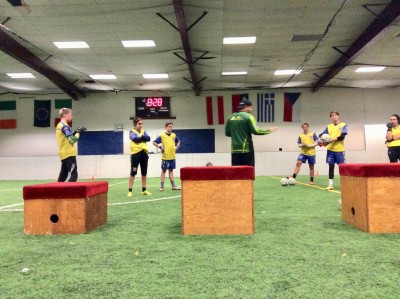GK training center
Choosing a youth soccer club
ASK THE RIGHT QUESTIONS!!
Choosing a youth soccer club has become so political & the most difficult task that a parent will do.
Make no mistake about it, everyone knows that most youth soccer clubs today are a big business. Normally managed by former soccer players with little to NO experience in running a business.
Furthermore, some clubs will do anything to attract players into their clubs. Some even go as far as telling kids they can get them “spots & tryouts” with professional clubs overseas with teams in the English Premier league or Spanish league La Liga.
Youth soccer non profit organization?
These clubs claim to be non–profit charity 501 (c)(3) receiving a number of tax-breaks, “KICKBACKS”, all-expense-paid trips for coaches, salaries, etc.
However, all of these benefits have made clubs compete for larger numbers of kids. As a result, youth soccer players are just a “number” where many of them get NO ATTENTION from the club. But only small of groups of kids will be taken seriously (better players)
PARENTS IN FEAR
Furthermore, 90% of the parents are afraid to say ANYTHING or even complain because they are afraid the clubs will use it against their kids.
This type of behavior generally happens in bigger youth soccer clubs but it happens less frequently in smaller clubs where the number of kids is not as significant.
Everyone knows what happens in the youth soccer clubs. However, NOBODY DARES TO SAY OR DO ANYTHING. In fact, parents and children seem to be more stressed-out when dealing with these clubs.
4 Important facts when choosing a youth soccer club
First, you MUST have a clear idea of what your purpose is. What exactly do you want this club to do for your child?
1. Culture:
Find a youth soccer club that teaches athletes character, leadership and confidence.
For example, most kids will spend most of their time in team trainings, games, tournaments, trips etc. As result, when choosing a club understand the type of team and organization culture they will provide to your child.
Furthermore, part of this youth club culture should focus on the athletes personal growth rather than the club’s winning records.
For example, when clubs are focusing on the wrong priority, you will almost immediately notice ego & arrogance floating among coaches, staff members and directors.
For instance, even when the staff speaks to you, they will let you know about their championships, accomplishments and brag about how great they are.
Their past achievements, connections & sizes of clubs are more important to them than the players. As result, the club’s culture can either damage the athlete progress or could make them the best athletes around.
2. An Open minded club:
There are a number of clubs who discourage soccer players from doing other activities or even doing trainings outside their own.
Furthermore, some of them even go as far as threatening players to be removed from teams or moved down to a lower level team. In addition, some of these kids do not get playing time if they go out of their club for additional training, camps or do other activities.
Moreover, some of these clubs and their coaches are not open to new ideas, different team tactics and playing formations or any changes that is not within their standard. Basically ” my way or the highway” & everything by the book attitude.
Open minded clubs will take suggestions & criticism very well and make real changes that will benefit the athletes and not the clubs financial status and sizes.
3. Not bias:
Biasness is sometimes very obvious in some clubs. For example, some coaches will give more playing time to players who they like most.
If winning records is all coaches & clubs have in mind then you can be certain “the better players” will play more than others. However, the rest of the players will get little attention and almost no real & honest training.
On the other hand, it is near impossible to focus on a legitimate soccer development program When clubs are too big. This is is just common sense.
For example, these clubs always claim they have the “best” coaches & training. However, how is it possible that ONE youth soccer club has ALL the best coaches in the State? does that mean all other coaches are terrible?
The point is, once you have a large number of people, more problems occur. As result, you will have to settle with a very basic training plan for EVERYBODY and SLIGHT better training for a small percentage of players who make higher level team.
Where do all players go?
Furthermore, it is difficult to keep up with every player who signs up. In other words, some coaches have so many players in their rosters that they ALL get the same evaluations. However, only a few get better scores.
As result, you have players stuck or placed in teams where they do not belong. Plus, players who never get to move up to the higher teams.
4. Development focused:
This is tricky… ALL CLUBS will claim to be 100% focused on developing players. This is the #1 sells pitch for clubs.
To be fair, some clubs concentrate only on developing players and providing a great environment to play soccer. As result, these goalkeepers & soccer players make progress fairly quickly.
However, I go back to the previous question, what do you want this club to do for your child?
Your first focus should be DEVELOPMENT. If your child does not get developed then I guarantee you, your child will never go to far in soccer. However, when you are in very large club, it is almost certain somebody will be left behind. This is just pure common sense.
WINNING RECORDS HAS NOTHING TO DO WITH PLAYERS DEVELOPMENT.
Some people would claim that if a team has a winning record, this would probably mean that the players must be getting excellent training or getting better individually
However, the team may be playing better, but the individual players are NOT improving. For example, players continue to struggle, make same mistakes, they are the same player from the beginning of the season.
Therefore, as you search for a club, search in-depth about what this clubs priorities are, development? or winning records?
In conclusion,
As you search and interview these clubs, you will discover tons of information. Pay attention to details and ask the RIGHT QUESTIONS.
For example, some amateur clubs will tell you what “you want to hear” vs “what you need to hear”. If you ask the right questions, some of them will give you subtle messages. They brag about how big their club is and all the National or State championships they’ve won.
Furthermore, they will spend time talking about players who played in national team and play Division I college etc. As I said, stuff that they know soccer parents & players want to hear.
Moreover, just because a club has former players who are currently playing in the National Team, this does NOT guarantee you will be the next to be called at the national team….Do not get caught up with this hype!!!
By the way, there are obvious differences between big clubs vs small clubs. Simple common sense; when working or training with LESS people allows you to provide quality service than working with lots of people.
Last, NOT ALL CLUBS ARE THE SAME, we’ve found a number of local clubs who will do ANYTHING to help their kids get better, gain playing experience and provide their players with unforgettable soccer journey.
However, if you are not getting the training or the attention that you need to improve, then it is time to start thinking outside the club and get your training. You would do the same in school. Is called TUTORING program.
Read More on this Subject:
US Soccer blundered badly on High School soccer. of socceramerica.com
High school versus club soccer; ten mistakes coaches make – By Chris Hummer of soccerwire.com
High School vs. Club: Can this storm be sent out to sea? – By Greg Winkler of SoccerAmerica.com
More to explorer
Who stresses more during games parents or athletes?
Nervous soccer parents

Understanding Athlete Burnout
Athlete burnout is defined by Sport Psychologists as: physical/emotional exhaustion, sport devaluation, reduced athletic performance and accomplishment”. Burnout can occur at a VERY YOUNG AGE. I’ve personally met many 12 yrs old with serious signs of burnout. But sadly there are a number of parents who refuse to believe their kids are too young to burnout, instead they insist that

Goalkeeper coaching styles
There is a BIG difference between TRAINING a goalkeeper and DEVELOPING a goalkeeper. I’m very sure that you have encountered many coaches, who, before they even say their names, they talk about their winning records, championships, their “national rankings” and their tons of certifications they’ve gained over the years. It seems as if their egos and history of winning records